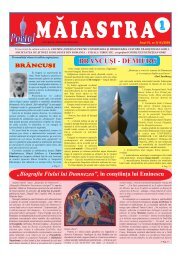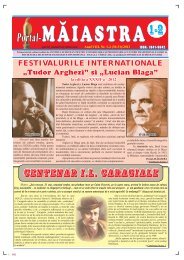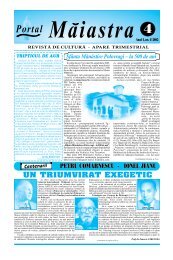You also want an ePaper? Increase the reach of your titles
YUMPU automatically turns print PDFs into web optimized ePapers that Google loves.
pag. 31<br />
Se anunţă o nouă carte<br />
Sorana Georgescu-Gorjan, fi ica inginerului Ştefan Georgescu-<br />
Gorjan, cel care a transpus în metal, la Târgu-Jiu, visul lui Constantin<br />
Brâncuşi de a reliza pe pământurile natale o Coloană fără sfârşit, şi-a<br />
dedicate viaţa valorifi cării moştenirii scrierilor tatălui ei despre mare<br />
sculptor roman, precum şi cercetărilor sale proprii în acelaşi domeniu al<br />
brâncuşiologiei. Publicăm, cu acordul domniei sale, câteva texte foarte<br />
interesante, mai puţin cunoscute îndeobşte, din cartea afl ată în curs de<br />
apariţie, AŞA GRĂIT-A BRÂNCUŞI (AINSI PARLAIT BRANCUSI<br />
VIII.1 CLOŞCA – LA COUVEUSE – THE<br />
BROODING HEN<br />
(VIII.1a) [Povestire fantastică] La începutul<br />
lumii, când a văzut omul pentru prima dată o cloşcă pe<br />
ouă, a întrebat-o ce face? (pe vremea ceea animalele<br />
vorbeau aceeaşi limbă ca oamenii). Animalele aveau<br />
foarte mare respect pentru oameni. Cloşca s-a sculat şi<br />
a poftit pe om să caute un loc să şază ca să-i explice. Şi<br />
i-a explicat şi i-a explicat şi atât de mult că întorcânduse<br />
la ouă le-a găsit reci. De aceea şi acum cloştele ne<br />
sar în cap când ne apropiem de cuibul lor.*<br />
(Doina Lemny, Cristian Robert Velescu -<br />
Brâncuşi inedit – Ed. Humanitas, 2004, p. 51)<br />
Histoire de brigands<br />
Il y avait dans les temps très, très, très anciens<br />
temps, quand les hommes ne savaient pa comment les<br />
bêtes viennent au monde… Un jour de ces temps-là,<br />
un homme a trouvé une poule qui couvait ses œufs.<br />
Et comme ces temps-là les bêtes et les hommes se<br />
comprenaient, il lui demanda qu’est-ce qu’elle faisait.<br />
Et comme la poule était gentille – car ces temps-là les<br />
bêtes avaient beaucoup de respect pour les hommes –<br />
Ah! beaucoup, beaucoup, beaucoup plus que maintenant<br />
– elle se leva pour ne pas tenir un homme debout et<br />
s’en alla lui expliquer. Et lui expliqua longtemps,<br />
longtemps, et tant que, quand elle retourna à ses œufs,<br />
les œufs étaient déjà gâtés.<br />
C’est pourquoi que de nos jours les poules qui<br />
couvent les œufs se fâchent à nous crever les yeux<br />
quand nous nous approchons de leur nids.<br />
(This Quarter, 1925, p. 237; Integral, 1925 –<br />
Brezianu, 1998, p. 61, fi g. 108–; Hulten et al., 1986,<br />
p. 166)<br />
Tall Tale<br />
Once upon a time, long, long ago, when men<br />
did not know how animals come into the world…. One<br />
day way back then, a man came across a hen sitting on<br />
some eggs. Since people and animals understood each<br />
other, he asked the hen what she was doing. And since<br />
the hen was considerate and did not want to keep him<br />
on his feet – in those days animals had great respect for<br />
people so very, very, very much more than now – she<br />
got up and went off to tell him. She took a very, very<br />
long time doing so, and by the time she got back, the<br />
eggs had gone rotten.<br />
That is why brooding hens nowadays get spitting<br />
mad at us when we get close to their nests.<br />
(P. Hulten, N.Dumitrascu, Al. Istrati – Brancusi –<br />
Ed. Flamarion, Paris et al., 1987, p. 166, tr. ed. Egan)<br />
VIII.2 FLUTURELE – LE PAPILLON – THE<br />
BUTTERFLY<br />
(VIII.2a) Le beau papillon est mort sous le vitrail<br />
d’en haut. En vain j’ai ouvert les deux grandes portes<br />
et les six vasistas: quatre au-dessus des deux portes<br />
et deux sur le toit d’en face du vitrail. En vain avec<br />
une perche je voulu le faire trouver la sortie. Ce beau<br />
papillon attiré par la lumière s’est cogné la tête contre<br />
la vitre jusqu’à ce qu’il est mort.<br />
C’est ainsi avec nous, quand notre lumière<br />
intérieure est plus grande que notre savoir, nous nous<br />
cassons la tête contre les murs infranchissables, quand<br />
il nous serait si facile de trouver l’issue.*<br />
(P. Hulten, N.Dumitrascu, Al. Istrati – Brancusi<br />
– Ed. Flamarion, Paris et al., 1986, p. 250; Brâncuşi<br />
inedit, 2004, p. 82)<br />
A beautiful butterfl y died beneath the skylight.<br />
I opened the two big doors and the six transoms: four<br />
over the two doors and two in the roof across from the<br />
skylight. But it was no use. I took a pole and tried<br />
to coax it out. Again no luck. The beautiful butterfl y,<br />
drawn by the light, fl ew at the skylight until it died.<br />
So it goes with us. When our inner light outshines<br />
our intellect, we go crashing into impassable walls, and<br />
all the time the way out is so easy to fi nd.<br />
(Hulten et al., 1987, p. 250, tr. ed. Egan)<br />
Frumosul fl uture a murit sub vitraliul de sus.<br />
În zadar am deschis cele două uşi mari şi cele şase<br />
ferestruici: patru deasupra celor două uşi şi două de pe<br />
acoperişul din faţa vitraliului. În zadar cu o prăjină am<br />
vrut să-l fac să găsească ieşirea. Frumosul fl uture atras<br />
de lumină s-a izbit cu capul de geam până ce a murit.<br />
Aşa e şi cu noi, când lumina noastră interioară e<br />
mai mare decât ştiinţa noastră, ne spargem capetele de<br />
ziduri de netrecut, când ne-ar fi atât de uşor să găsim<br />
ieşirea.<br />
(traducere Sorana Georgescu-Gorjan)<br />
VIII.3 BARZA – LA CIGOGNE – THE STORK<br />
(VIII.3a) Histoire de brigands contée par ma<br />
mère<br />
Quand la cigogne a rencontré le moineau pour la<br />
première fois et l’a vu si petit, [elle] se mit tout de suite<br />
en devoir pour le faire grandir. Elle le mit dans son nid<br />
et du matin au soir lui porta tout ce qu’elle trouva de<br />
meilleur pour lui donner à manger, l’entoura de tous<br />
les soins et tous les jours ainsi pendant neuf années.<br />
Un jour de la neuvième année – en plein hiver – elle<br />
s’est donné beaucoup de peine pour trouver quelques<br />
miettes à lui porter. Elle arriva le soir au moineau avec<br />
[pour] ainsi dire rien dans le bec – pour la première<br />
fois n’ayant rien à lui donner à manger. Elle le regarda<br />
attentivement et s’est dit: «Depuis neuf années que je<br />
me donne de la peine et il n’a pas bougé d’une tête<br />
d’épingle!» – et d’un coup de bec l’avala.*<br />
(Hulten et al., 1986, p. 167 fss)<br />
Tall story told by my mother<br />
When the stork met the sparrow for the fi rst time<br />
and saw it so small, she set about making it grow. She<br />
put it in her nest and all day long brought it whatever<br />
she found best to feed it. She looked after it every day<br />
for nine years. One day of the ninth year, in the depth<br />
of winter, she tried hard to fi nd some crumbles to bring<br />
to it. She arrived in the evening at the sparrow having,<br />
so to speak, nothing in its beak – for the fi rst time she<br />
had nothing to give it to eat. She looked attentively at<br />
the sparrow and thought: “For nine years I have taken<br />
troubles and it didn’t grow a bit” and she opened her<br />
beak and swallowed it down.<br />
(traducere Sorana Georgescu-Gorjan)<br />
Portal-MĂIASTRA <strong>Anul</strong> V, nr. 4(21)/<strong>2009</strong><br />
FABULELE LUI BRÂNCUŞI<br />
/ THUS SPAKE BRANCUSI), reunite în capitolul VIII FABULELE<br />
LUI BRÂNCUŞI (LES FABLES DE BRANCUSI / BRANCUSI’S<br />
FABLES). Cartea reuneşte aforismele, maximele, refl ecţiile şi tot ce s-a<br />
păstrat din spusele lui Brâncuşi, selectate cu maximă acribie, pe criteriul<br />
credibilităţii, din publicaţiile vremii şi mărturiile calor care le-au auzit şi<br />
menţionat în cărţi şi reviste, corectând greşelile traducerilor anterioare.<br />
Lucian GRUIA<br />
Povestire fantastică spusă de mama<br />
Când barza a întâlnit vrabia pentru prima oară şi<br />
a văzut-o atât de mică, s-a apucat de îndată s-o facă să<br />
crească. A pus-o în cuibul său şi ziua întreagă îi aducea<br />
tot ce găsea mai bun, ca s-o hrănească. A îngrijit-o aşa,<br />
zi de zi, timp de nouă ani. Într-o bună zi din al noulea<br />
an – în plină iarnă – s-a străduit mult să găsească câteva<br />
fi rimituri ca să i le aducă. A ajuns seara la vrabie,<br />
neavând, ca să spunem aşa, nimic în cioc – pentru<br />
prima oară nu avea ce să-i dea să mănânce. A privit-o<br />
atent şi şi-a spus: “ Timp de nouă ani m-am tot străduit<br />
şi n-a crescut nici c-un vârf de ac” şi deschizând ciocul,<br />
o înghiţi.<br />
(traducere Sorana Georgescu-Gorjan)<br />
VIII.4 COPACUL – L’ARBRE – THE TREE<br />
(VIII.4a) L’arbre déraciné<br />
Sur une seule et petite racine il a poussé très très<br />
haut car autour de lui il y avait des autres [arbres] cent<br />
fois plus âgés et leur ombre l’empêchait de voir le soleil,<br />
mais ils l’aidaient à grandir sans souci de la tempête.<br />
En peu de temps il fut [aus]si haut que les autres. Il vit<br />
le soleil et ivre de joie il poussa plus haut et toujours<br />
sur sa seule et petite racine. Un jour le bûcheron coupa<br />
les grands [arbres] et il resta tout seul sur un grand<br />
espace. La tempête arriva et aussitôt il tomba par terre,<br />
car il n’avait qu’une seule et petite racine.<br />
J’ai serré toutes ses petites branches du sommet,<br />
comme on serre l’être chéri qu’on ne voit plus jamais.<br />
Puis, assis sur son jeune tronc, j’ai noté cette histoire<br />
pour l’écrire sur son écorce que j’ai trouvée, qu’un<br />
passant s’était amusé à découvrir .*<br />
(Hulten et al., 1986, p. 210; Dation Brancusi,<br />
2003, p. 90; Brâncuşi inedit, 2004, p. 93)<br />
The Uprooted Tree<br />
Its root was small, but it grew very, very tall.<br />
Around it there stood other trees a hundred times older;<br />
their shade prevented the sun from coming through, but<br />
thanks to them it could grow without having to worry<br />
about storms. Before long, it was as tall as the others<br />
and could see the sun. Mad with joy, it grew even taller,<br />
but still on its one small root. One day, the woodsman<br />
cut down the big trees, and it was left standing all by<br />
itself in the clearing. A storm came, and it fell right<br />
away, for all it had was that lone little root.<br />
I clasped all of its little branches (at the top), the<br />
way a person clasps the one he loves and will never see<br />
again. Then, seated on its young trunk I recorded this<br />
story, writing it on some white bark which a passerby<br />
had seen fi t to cut away.<br />
(Hulten et al., 1987, p. 210, tr. ed. Egan)<br />
Arborele dezrădăcinat<br />
A crescut foarte înalt, pe o singură rădăcină<br />
mică, căci în jurul lui erau alţi (arbori) de o sută de ori<br />
mai bătrâni şi umbra lor îl împiedica să vadă soarele<br />
dar ei l-au ajutat să crească fără a se sinchisi de furtună.<br />
În scurtă vreme ajunse la fel de înalt ca ceilalţi şi văzu<br />
soarele. Beat de fericire, crescu şi mai mult, dar tot pe<br />
acea unică şi mică rădăcină. Într-o zi, pădurarul tăie<br />
copacii mari şi el rămase singur într-un spaţiu mare.<br />
A venit furtuna şi el căzu de îndată, căci nu avea decât<br />
acea unică şi mică rădăcină.<br />
I-am strâns toate crenguţele din vârf, aşa cum<br />
strângi o fi inţă dragă pe care n-o vei mai vedea vreodată.<br />
Apoi, aşezat pe trunchiul său, am notat această poveste,<br />
ca s-o scriu pe o bucată de scoarţă albă pe care un<br />
trecător se distrase s-o rupă.<br />
(traducere Sorana Georgescu-Gorjan)<br />
(din volumul Soranei Georgescu-Gorjan - AŞA<br />
GRĂIT-A BRÂNCUŞI, afl at în curs de apariţie)





